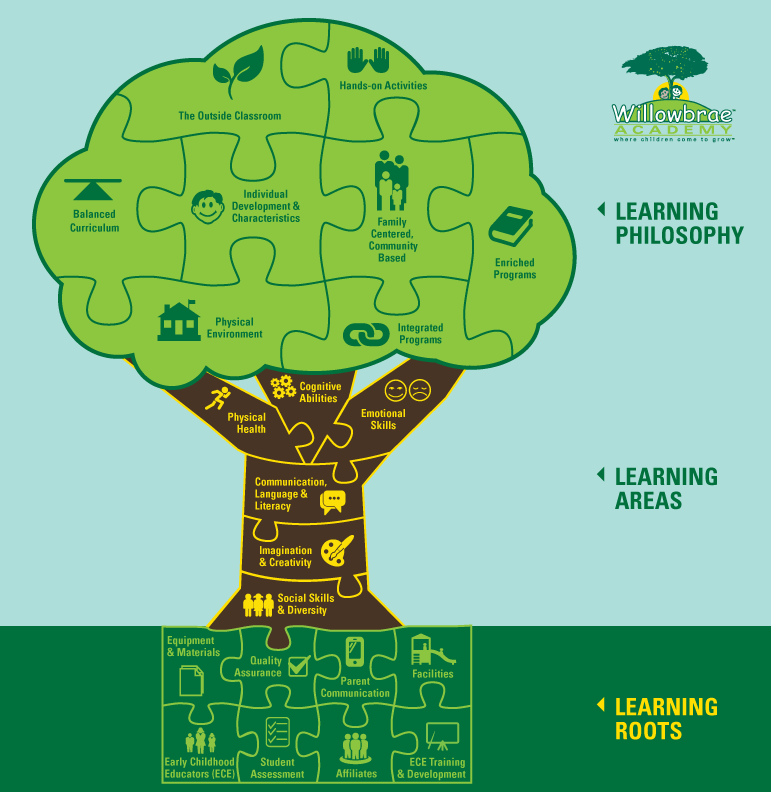LEARNING TREE
The Learning Tree is the foundation on which Willowbrae Academy is built. Like a sapling, children will grow and develop into a strong independent tree, in a nurturing caring environment. Our Learning Philosophy, branches provide the framework for learning, our six learning areas form the mighty trunk of our learning tree and our learning roots are the base that support the tree. From the roots of the Willowbrae Learning Tree to the top of the branches, each part plays a vital part in providing the highest standard of childcare possible. Our Learning Tree provides children a solid foundation for lifelong learning. At Willowbrae Academy we firmly believe it is a place “Where children come to grow!”
Select the puzzle pieces for more details

Learning Philosophy
Balanced Curriculum
Children learn best through play whether it is teacher guided or child initiated. Willowbrae Academy curriculums are designed to create learning opportunities through interactions, relationships, environments and experiences. We believe that a balanced curriculum in all areas of development will allow children to maximize their learning potential.
Learning Philosophy
The Outside Classroom
The outside environment is an extension of the classroom. Outdoor play develops motor skills, contributes to cognitive and social-emotional development, and builds an appreciation for the outdoors. At Willowbrae, children have opportunities to explore the community and surrounding resources as part of the curriculum.
Learning Philosophy
Hands-on Activities
Learning by doing. Hands-on activities involve children in a total learning experience which enhances their ability to think critically. Children engage their minds and bodies in sensory experiences while listening, talking and making their own discoveries.
Learning Philosophy
Programs
Willowbrae Academy recognizes children’s learning needs are diverse. We believe in providing programs that meet the needs of every child in our care. Staff expose children to new experiences and skills that will help then grow as individuals and reach their full potential. Children participate in fun activities that enrich, strengthen and expand their learning.
Learning Philosophy
Physical Environment
Our Academies are designed by professionals who focus on a child’s needs. Willowbrae provides children with a safe, healthy, comfortable, flexible, and child-sized environment that supports their physical, emotional, social and cognitive development.
Learning Philosophy
Integrated Programs
All learning is connected. Integrated programs allow children to add other elements to existing activities. Our programs are based on a child’s interest and designed to stimulate curiosity and possibilities.
Learning Philosophy
Every child is a unique individual and we understand that all children grow and develop at their own pace. Our Academies help a child find their sense of self and promote the development of values, morals, emotions and intelligence. We encourage multiculturalism, inclusion, independence, self-confidence and respect for oneself and others.
Learning Philosophy
Family Centered, Community Based
At Willowbrae we firmly believe that to effectively meet children’s needs, staff must work closely with families and communities. Teaching and learning is not an isolated endeavour, rather teamwork involving positive interaction between children, staff, parents and community.
Learning Areas
Physical Health
Children experience safe and caring environments where physical health and positive lifestyle choices are promoted and encouraged. Children explore body and movement, develop gross and fine motor skills, learn about food and nutrition, and are taught to take responsibility for personal care.
Learning Areas
Cognitive Abilities
Children experience open and flexible environments where playful exploration and problem solving are encouraged. Children test their limits, learn the dynamics of working together, and develop different strategies to identify and work out problems. Children also learn to question, observe and inquire about the world around them.
Learning Areas
Emotional Skills
Children experience a safe and caring environment where their emotional health, positive self-identities, and sense of belonging are fostered. Children develop a sense of self and a sense of others. Children learn to form trusting, respectful relationships.
Learning Areas
Communication, Language and Literacy
Children experience intellectually, socially and culturally engaging environments where their speech, language, literacy, social communication skills are valued and supported. These skills are developed through classroom activities, peer interaction, and active play.
Learning Areas
Imagination and Creativity
Children are exposed to open and flexible environments where imagination and creativity are encouraged through dramatic play, music, dance, arts and crafts. Children create imaginary scenarios in which they explore new possibilities. Children are encouraged to create something new and original.
Learning Areas
Social Skills and Diversity
Children are exposed to a socially inclusive and culturally sensitive environment, where social responsibility is nurtured. Children are taught to respect diversity and appreciate their own uniqueness and that of others. Children learn how to be emphatic, co-operative, helping, and how to develop friendships.
Learning Roots
Equipment & Materials
- Age and developmentally appropriate equipment and programs
- Daily mandatory cleaning
- Regular inspection and maintenance
- Monthly classroom programming allowances
Learning Roots
Quality Assurance
- Willowbrae Quality Assurance Program
- Exceeds government regulations
- Early Childhood Educator employee performance reviews
- Regular Director employee performance reviews
Learning Roots
Parent Communication
- Parent group
- Parent meetings
- Parent/teacher meetings
- Braeview communication software
- Daily reports
- Newsletters
Learning Roots
Facilities
- Biometric finger print access
- Large classrooms with lots of natural light
- Secure outdoor playgrounds
- Liveview HD cameras
- Professional cleaning staff
- On-site kitchens and chefs
Learning Roots
Early Childhood Educators (ECE)
- Highly qualified and experienced professionals
- CPR and first-aid certified
- Abide by the ECE Code of Ethics
Learning Roots
Student Assessment
- Daily reporting
- Progress reports
Learning Roots
Affiliates
- Hearing and Speech Pathologists
- Child Psychologists
- Early Intervention specialists
- Early Intensive Behaviour Intervention professionals
- Nutritionists and Dietitians
- Occupational Therapists
- Fitness Experts and Health specialists
- Hal Johnson & Joanne McLeod of BodyBreak
- Social Workers
- Physiotherapists
- Pediatricians
Learning Roots
ECE Training & Development
- Staff meetings
- Early Childhood Educator professional development
- Ongoing Willowbrae Academy training

